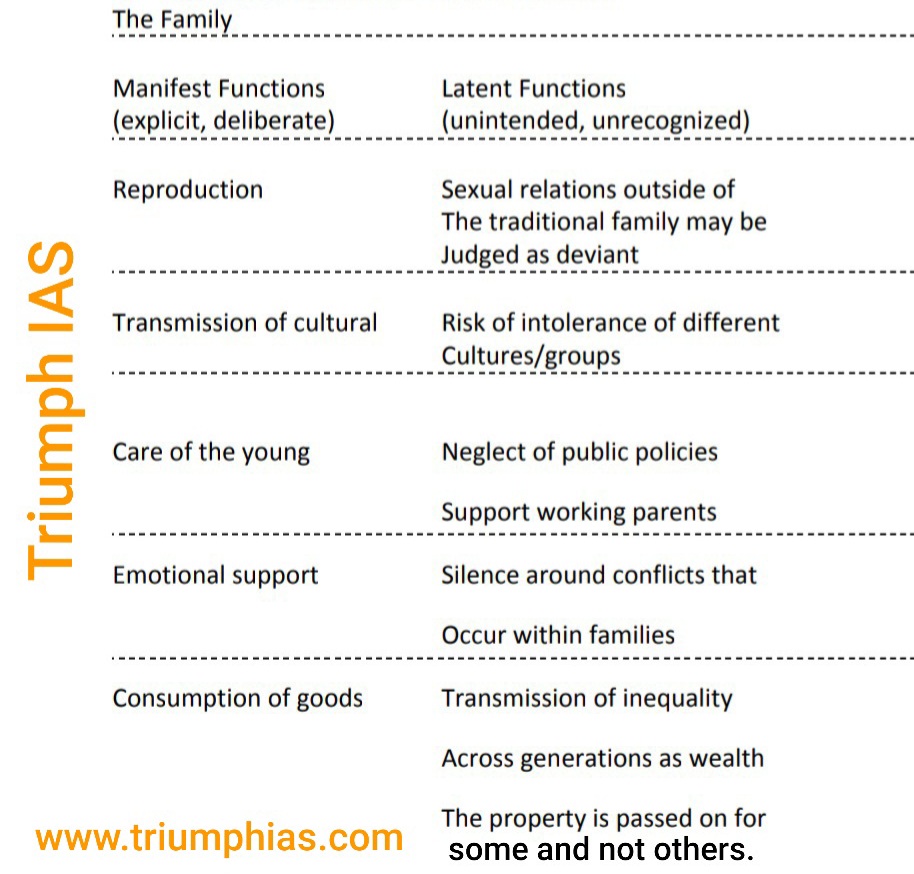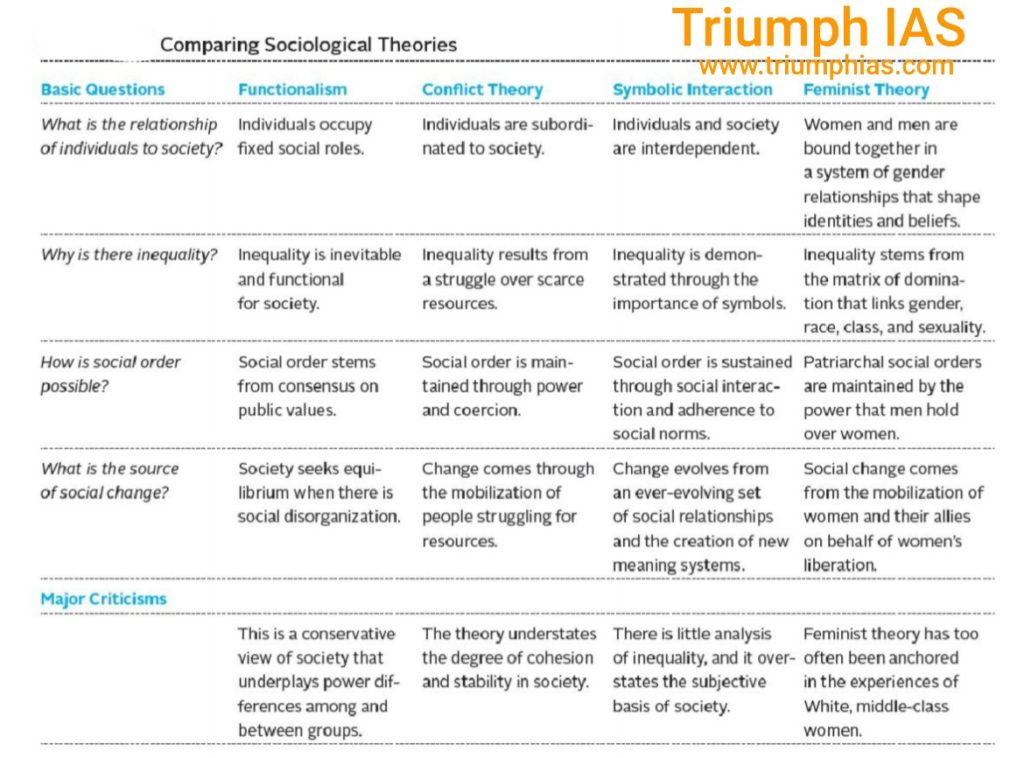Sociology is the study of human behavior in society. Sociologists are interested in the study of people and have learned a fundamental lesson: Human behavior, even when seemingly “natural” or taken for granted, is shaped by social structures—structures that have their origins beyond the immediately visible behaviors of everyday life. In other words, all human behavior occurs in a social context. That context— the institutions and culture that surround us—shapes what people do and think.
The founders of sociology have established theoretical traditions that ask basic questions about society and inform sociological research. The idea of theory may seem dry to you because it connotes something that is only hypothetical and divorced from “real life.” Sociological theory though is one of the tools that sociologists use to interpret real life.
- Sociologists use theory to organize their observations and apply them to the broad questions sociologists ask, such as: How are individuals related to society? How is social order maintained? Why is there inequality in society? How does social change occur?
- Different theoretical frameworks within sociology make different assumptions and provide different insights about the nature of society. In the realm of macrosociology are theories that strive to understand society as a whole. Durkheim, Marx, and Weber were macrosociological theorists.
- Theoretical frameworks that center on face-to-face social interaction are known a microsociology. Some of the work derived from the Chicago School—research that studies individuals and group processes in society—is microsociological.
- Although sociologists draw from diverse theoretical perspectives to understand society, four theoretical traditions form the major theoretical perspectives: functionalism, conflict theory, symbolic interaction, and, more recently, feminist theory.
FUNCTIONALISM
- Functionalism has its origins in the work of Herbert Spencer & Durkheim, who were especially interested in how social order is possible and how society remains relatively stable. Functionalism interprets each part of society in terms of how it contributes to the stability of the whole.
- As Durkheim suggested, functionalism conceptualizes society as more than the sum of its component parts. Each part is “functional” for society—that is, contributes to the stability of the whole. The different parts are primarily the institutions of society, each of which is organized to fill different needs and each of which has particular consequences for the form and shape of society. The parts each then depend on one another.
- The family as an institution, for example, serves multiple functions. At its most basic level, the
family has a reproductive role. Within the family, infants receive protection and sustenance. As they grow older, they are exposed to the patterns and expectations of their culture. Across generations, the family supplies a broad unit of support and enriches individual experience withma sense of continuity with the past and future. All these aspects of family can be assessed by how they contribute to the stability and prosperity of society. The same is true for other institutions. - The functionalist framework emphasizes the consensus and order that exist in society, focusing
on social stability and shared public values. From a functionalist perspective, disorganization in
the system, such as an economic collapse, leads to change because societal components must adjust to achieve stability. This is a key part of functionalist theory —that when one part of society is not working (or is dysfunctional, as they would say), it affects all the other parts and creates social problems. Change may be for better or worse. - Changes for the worse stem from instability in the social system, such as a breakdown in shared values or a social institution no longer meeting people’s needs.
- Functionalism was a dominant theoretical perspective in sociology for many years, and one of
its major theorists was Talcott Parsons (1902–1979). In Parsons’s view, all parts of a social
system are interrelated, with different parts of society having different basic functions. - Functionalism was further developed by Robert Merton (1910–2003). Merton saw that social
practices often have consequences for society that are not immediately apparent. He suggested
that human behavior has both manifest and latent functions. Manifest functions are the stated
and intended goals of social behavior. Latent functions are neither stated nor intended. The
family, for example, has both manifest and latent functions, as demonstrated in the Table below,

- Critics of functionalism argue that its emphasis on social stability understates the roles of power
and conflict in society. Critics also disagree with the explanation of inequality offered by functionalism— that it persists because social inequality creates a system for the fair and equitable distribution of societal resources. - Functionalists argue that it is fair and equitable that the higher social classes earn more money because they are more important (functional) to society. Critics disagree, saying that functionalism is too
accepting of the status quo. From a functionalist perspective though, inequality serves a
purpose in society: It provides an incentive system for people to work and promotes solidarity among groups linked by their common social standing.
CONFLICT THEORY
- Conflict theory emphasizes the role of coercion and power in society and the ability of some to influence and control others. Functionalism emphasizes cohesion within society. Conflict theory emphasizes strife and friction. Conflict theory pictures society as comprised of groups that compete for social and economic resources. Social order is maintained not by consensus but by domination, with power in the hands of those with the greatest political, economic, and social resources. When consensus exists, according to conflict theorists, it is attributable to people being united around common interests, often in opposition to other groups.
- According to conflict theory, inequality exists because those in control of a disproportionate
share of society’s resources actively defend their advantages. The masses are not bound to
society by their shared values but by coercion at the hands of the powerful. - In conflict theory, the emphasis is on social control, not on consensus and conformity. Those with the most resources exercise power over others; inequality and power struggles are the result.
- Conflict theory gives great attention to class, race, gender, and sexuality in society because these are seen as the grounds of the most pertinent and enduring struggles in society.
- Conflict theorists see inequality as inherently unfair, persisting only because groups who are economically advantaged use their social position to their own betterment. Their dominance even extends to the point of shaping the beliefs of other members of the society by controlling public information and holding power in institutions such as education and religion that shape what people think and know. From the conflict perspective, power struggles between conflicting groups are the source of social change. Those with the greatest power are typically able to maintain their advantage at the expense of other groups.
- Conflict theory has been criticized for neglecting the importance of shared values and public consensus in society while overemphasizing inequality. Like functionalist theory, conflict theory finds the origins of social behavior in the structure of society, but it differs from functionalism in emphasizing the importance of power.
SYMBOLIC INTERACTION - The third major framework of sociological theory is symbolic interaction. Instead of thinking of society in terms of abstract institutions, symbolic interaction emphasizes immediate social interaction as the place where “society” exists. Because of the human capacity for reflection, people give meaning to their behavior. The creation of meaning is how they interpret the different behaviors, events, or things that happen in society.
- As its name implies, symbolic interaction relies extensively on the symbolic meaning that people develop and employ in the process of social interaction. Symbolic interaction theory emphasizes face-to-face interaction and thus is a form of microsociology, whereas functionalism and conflict theory are more macrosociological.
- Derived from the work of the Chicago School, symbolic interaction theory analyzes society by
addressing the subjective meanings that people impose on objects, events, and behaviors. Subjective meanings are important because, according to symbolic interaction, people behave based on what they believe, not just on what is objectively true. Symbolic interaction sees society as socially constructed through human interpretation. Social meanings are constantly modified through social interaction. - People interpret one another’s behavior; these interpretations form social bonds. These interpretations are called the “definition of the situation.” For example, why would young people smoke cigarettes even though all objective medical evidence points to the danger of doing so? The answer is in the definition of the situation that people create. Studies find that teenagers are well informed about the risks of tobacco, but they also think that “smoking is cool,” that they themselves will be safe from harm, and that smoking projects an image—a positive identity for boys as a “tough guy” and for girls as fun-loving, mature, and glamorous. Smoking is also defined by young women as keeping you thin—an ideal constructed through dominant images of beauty. In other words, the symbolic meaning of smoking overrides the actual facts regarding smoking and risk.
FEMINIST THEORY
- Contemporary sociological theory has been greatly influenced by the development of feminist theory. Prior to the emergence of second-wave feminism (the feminist movement emerging in the 1960s and 1970s), women were largely absent and invisible within most sociological work—indeed, within most academic work.
- When seen, they were strongly stereotyped in traditional roles as wives and mothers. Feminist theory developed to understand the status of women in society and with the purpose of using that knowledge to better women’s lives.
- Feminist theory has created vital new knowledge about women and has also transformed what
is understood about men. Feminist scholarship in sociology, by focusing on the experiences of women, provides new ways of seeing the world and contributes to a more complete view of society. - Feminist theory takes gender as a primary lens through which to view society. Beyond that,
feminist theory makes the claim that without considering gender in society, one’s analysis of
any social behavior is incomplete and, thus, incorrect. At the same time, feminist theory
purports to analyze society with an eye to improving the status of women. Men are not excluded from feminist theory. In fact, feminist theory also argues that men are gendered subjects too. We cannot understand society without understanding how gender is structured in society and in women’s and men’s lives. - Feminist theory is a now vibrant and rich perspective in sociology, and it has added much to how people understand the sociology of gender—and its connection to other social factors, such as race, sexuality, age, and class.

CONCLUSION
- Functionalism, conflict theory, symbolic interaction, and feminist theory are by no means the only theoretical frameworks in sociology. For some time, however, they have provided the most prominent general explanations of society. Each has a unique view of the social realm. None is a perfect explanation of society, yet each has something to contribute.
- Functionalism gives special weight to the order and cohesion that usually characterizes society.
Conflict theory emphasizes the inequalities and power imbalances in society. Symbolic
interaction emphasizes the meanings that humans give to their behavior. Feminist theory takes
gender as a primary lens through which to understand society, especially in relation to other
structures of inequality. Together, these frameworks provide a rich, comprehensive perspective on society, individuals within society, and social change. Whatever the theoretical framework used, theory is evaluated in terms of its ability to explain observed social facts. The sociological imagination is not a single minded way of looking at the world. It is the ability to observe social behavior and interpret that behavior in light of societal influences.
👉Click the link below to see the details about the UPSC –Civils courses offered by Triumph IAS. https://triumphias.com/pages-all-courses.php
👉For Course Inquiry call Rakhi Bisht #7840888102
👉Connect to Vikash Ranjan Sir #8586861046
👉For more such notes, Articles, News & Views Join our Telegram Channel. https://t.me/triumphias

